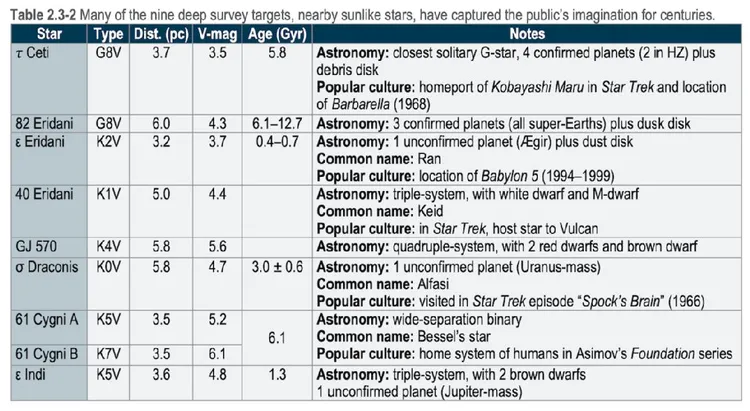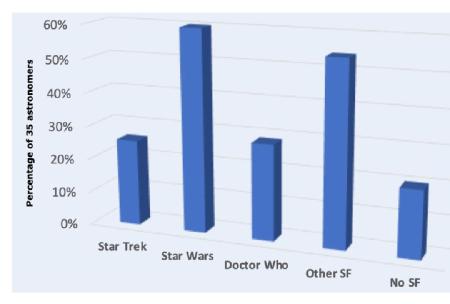Astronomers and Science Fiction
The damaging stereotype of the scientist as an obsessive geek has been around for many years now. In this trope, an interest in science fiction is associated with social awkwardness and a lack of contact with reality, often in young men. This stereotype does both science and science fiction a disservice. As this blog, and many others, discusses, an interest in or study of science fiction can shed a unique light onto aspects of science and society. The limited stereotype also fails to respect the diversity of experiences, interests, backgrounds and voices which make up the monolithic construct described as a “scientist”.
Nonetheless, anecdotally, the evidence for a connection between an interest in science and an interest in science fiction is fairly strong. A number of well known individuals in scientific and technical fields (representing a range of disciplines) have spoken or written publicly about their interest in SF. The connection between SF and space science is perhaps even stronger, since both typically involve the envisaging and exploration of aspects of the universe we inhabit. Examples of high-profile SF fans I can think of just off the top of my head from the astronomical community include planetary scientists Colin Pillinger and John Zarnecki, cosmologist Stephen Hawking, and astrophysicist Carl Sagan. More than that, discussions of SF, SF tropes and in-jokes are a common feature amidst communities of scientists, including on social media, and even occur in the peer-reviewed academic literature.
Just to give a few examples (see also Eldridge in “Science and Doctor Who”):
- The TARDIS supernova modelling code - rapid spectral modelling, open source software in which the origin of the name in Doctor Who is never explicitly stated (Kerzendorf & Sim 2014).
- The Cardassian Expansion - "a model in which the universe is flat, matter-dominated and accelerating" which states explicitly that "The name Cardassian refers to a humanoid race in Star Trek whose goal is to take over the universe, i.e. accelerated expansion. This race looks foreign to us and yet is made entirely of matter." (Freese & Lewis, 2002)
- Tatooines - a Star Wars reference used to describe circumbinary planets, as in the TATOOINE (The Attempt To Observe Outer-planets In Non-single-stellar Environments) radial velocity survey programme (Konaki et al 2010).
- MINBAR - the Multi-INstrument Burst ARchive, a repository for data on stellar explosions, named after a race from Babylon 5 (Galloway et al 2020, Galloway priv. comm.)
In fact the NASA design study for a proposed space telescope (The Habitable Exoplanet Observatory, HabEx) notes that of their nine primary targets, five systems have a pop-culture, science fiction resonance - not because this influences their selection, but because this is relevant to the degree of popular support for and public engagement with an expensive scientific survey telescope.

Figure: A table of targets selected for the mission study for the HabEx survey (NASA 2018). For five of the eight targets popular culture references drawn from science fiction are listed.
It is likely that astronomy and science fiction appeal to the same people because of their underlying similarity in intent: to extend our understanding of the universe in which we live. However, it is always nice to firm up these isolated examples with some actual statistics. With this in mind, I decided to undertake a survey of my colleagues in the Warwick Astronomy and Astrophysics group in February 2021. Since the advent of the Covid-19 pandemic, the group has used the networking service “Slack” for both social and academic interactions. Similar to a social media or discussion forum environment, this has permitted a relaxed atmosphere which encourages group members at all career stages to interact (up to a point). Using the #general channel which is designated for casual conversation, I asked:
Q: Are you a fan of, or have you been inspired by any of the following Science Fiction? (please click all that apply, even if your answer is no, I'd love to sample most of the group).
- 1. Star Trek,
- 2. Star Wars,
- 3. Doctor Who,
- 4. Other SF (feel free to specify in comment),
- 5. Not a science fiction fan.

Of the 36 responses (out of about 45 regular users of the forum, ranging from new graduates to senior professors), only seven did not consider themselves a fan of or inspired by science fiction. Of the remaining four fifths of the group, 10/29 selected Star Trek, 21/29 selected Star Wars, 10/29 selected Doctor Who, and 20/29 selected other science fiction, with examples mentioned including novels such as Dan Simmons’ Hyperion and Stanislaw Lem’s Solaris, television series including Battlestar Galactica, X-Files and Futurama, and films including 2001: A Space Odyssey.
It’s worth noting, however, that several participants observed in free-text comments that they became science fiction fans after becoming scientists rather than the reverse, or that they felt real world news stories (moon landings, shuttle missions, the television programme Sky at Night etc) had more impact on them. One participant also made the point that their interest in science fiction exists in spite of their enjoyment of science, rather than because of it, with their rational brain disengaged and no attempt to watch critically. We should also note that there is nonetheless a substantial minority of astronomers for whom science fiction holds no interest, and who can feel alienated by an assumption to the contrary.
Nonetheless, on the whole this statistical evidence does support the anecdotal: for this sample at least, an aptitude for astrophysics seems to go hand in hand with pleasure in science fiction. As for why…? Well, that’s a whole different question, and one which others are far more qualified than me to answer.
If any other astronomers would like to repeat this question to obtain similar statistics for their own institutes, do please let me know - I'd be fascinated to see them!
"Astronomers and Science Fiction", Elizabeth Stanway, Cosmic Stories blog, 21st March 2021.
